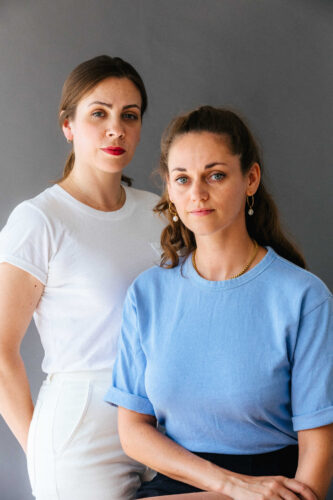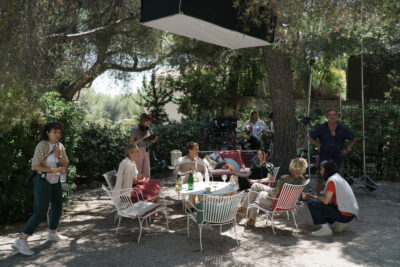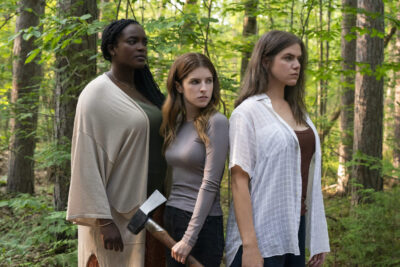It all started with a cold email. Back in 2016, producers Katie Bird Nolan and Lindsay Tapscott both fell in love with the story of Bonjour Tristesse, a cult classic in French literature. Not expecting to hear back, they reached out to the book’s publishers, asking if the film rights were available.
Now, eight years later, their contemporary English language adaptation of Bonjour Tristesse, written and directed by Durga Chew-Bose, is having its world premiere at TIFF 2024.
The process of securing the rights was not easy—that cold email began a long, three-year ordeal, during which the duo developed an even deeper appreciation for the story and its author.
Bonjour Tristesse is a coming-of-age story, honing in on one pivotal summer on the French seaside for 18-year-old Cécile (Lily McInerny). She’s relishing in the lavish vacation with her father, Raymond, and his girlfriend Elsa, until her late mother’s friend Anne (Chloë Sevigny) comes to visit. Her presence shakes up the group’s dynamics, shifting the trajectory of the summer and ultimately, Cecile’s life.

The book was written in 1954 by Françoise Sagan, who was only 18 at the time, and was banned immediately upon publication—its content deemed too risque.
“[Françoise] was a feminist before that word was even being thrown around. She did things to the beat of her own drum,” says Lindsay.
While Katie and Lindsay were working tirelessly to secure the rights to Bonjour Tristesse, they became close friends with Sagan’s son, Denis Westhoff, who went on to serve as an executive producer for the film.
“He let on that his mom would have been so into the way we were championing Bonjour Tristesse,” Lindsay says. “She would have been so here for the way we’re advocating for Durga and telling a young woman’s story through female eyes.”
Championing women’s voices is the mission of Babe Nation, Katie and Lindsay’s Toronto-based production company that champions female stories. The duo has an incredible origin story—a chance meeting at a clothing shop in Montreal led to the realization that their parents knew each other decades ago. They formed an instant friendship, and began writing together, making short films on tiny budgets in their shared Toronto apartment, dubbed “Babe Nation.”

Their first bigger project was Vanessa Matsui’s web series Ghost BFF, a dark comedy about mental health and female friendship. From there, they produced feature films The Rest of Us and White Lie, which both premiered at TIFF in 2019.
These are quietly powerful stories— stories of layered relationships between women, with complex female characters who are working through grief, emotional abuse or mental illness. But in the early days of the company, this wasn’t always what people associated with the name “Babe Nation.”
“With our name, for a while, we kind of got grouped into this pink, girl boss kind of vibe,” says Katie. “That was never the intention from the beginning. It was always about quiet quality, head down, excellent work with excellent people.”
One of these people is Durga Chew-Bose. Katie and Lindsay were huge fans of the Montreal-born writer and filmmaker, known for her poetic book of essays Too Much and Not The Mood. So, once again, they sent forth a cold email. Now, not only will Bonjour Tristesse be Chew-Bose’s directorial debut, she will also be awarded the Emerging Talent Award at TIFF this year. Katie and Lindsay agree her detailed vision for Bonjour Tristesse will resonate with viewers.
“She has an unbelievable vision and way of seeing the world,” Katie says.
“What has really come to the forefront in Durga’s version is all the ways in which women are so affected by each other,” Lindsay adds. “Little jealousies, but also admirations, the push and pull of trying to connect, hating each other, but also loving each other. There are three very different types of women…but how they melt together and inspire each other even when they’re at odds is very compelling.”

Back in 1958, Otto Preminger directed the original film adaptation of Bonjour Tristesse. But something about a man in his 60s telling a young woman’s coming-of-age story didn’t sit well with Lindsay and Katie. Once they made it to set, everyone knew there was something special about a team of women telling this story, a story that has resonated with young women dating back generations.
“So many women on our crew were like, ‘Oh my God, finally a young remake of Bonjour Tristesse.’ There was a real energy around the reclaiming of this young woman’s story by a group of young women,” says Katie.
This is the first ingredient for a Babe Nation project—an unrelenting passion for the story.
“We have this very simple barometer for a Babe Nation project, which is we both have to love it, like, can’t sleep without thinking about it,” Katie says. “But there’s a subtleness to it,” she adds. “There’s a slightly dark edge to the things that we’re drawn to.”
Their previous film leans a bit further into that darkness. Alice, Darling, a psychological thriller directed by Mary Nighy and starring Anna Kendrick, premiered at TIFF in 2022. The film tells the story of a woman pushed to a breaking point by her abusive boyfriend. The psychological abuse is depicted subtly, which Lindsay and Katie say was a conscious choice, reflecting how often it is overlooked in real-life relationships.
They received a powerful response to the film, particularly from women who resonated deeply with the way abuse was shown. “It was gratifying to know that it had the effect that we intended, which was that people, women, were seen,” says Lindsay.

‘Alice, Darling’. Samantha Falco/Lionsgate
The dark edge continues in Babe Nation’s upcoming projects: there’s Astonish Me, which Katie describes as a “sexy, dark, ballet story” based on the 2014 book by Maggie Shipstead, which they intend to adapt into a limited series.
Also on the go is The Temple, the fifth feature from White Lie writer-directors Calvin Thomas and Yonah Lewis, a body horror about a young billionaire dedicated to creating technology that can revive his parents from the dead.
While they have much to look forward to, the duo was recently reminded of the magic they’ve made thus far. Chew-Bose forwarded them an email thread from 2017, when Katie and Lindsay were so close to securing the rights to Bonjour Tristesse. Their latest efforts involved suggesting the names of various powerful executive producers they could attach to the project to get their foot in the door.
“Long story short, we never ended up even needing that kind of person to get the rights. We just kept going. Durga was like, ‘Whenever you guys have doubts, just remember that you did this by yourselves.’ That’s a huge thing that really pushed Lindsay and I on. Even to this day, it’s just the two of us,” Katie says.
So it’s no surprise when one of their pieces of advice for emerging filmmakers is to work with people you love.
“Some producers would say don’t work with your friends. But in our case, it’s been a really wonderful experience,” Katie says.
Their other, more succinct piece of advice? “Don’t be scared of a cold email.”



 Follow Us On Instagram
Follow Us On Instagram
